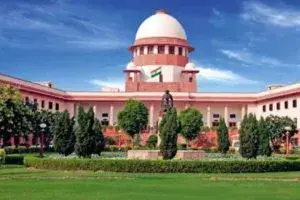By Priya Adlakha and Tulip De
On October 22, 2019, the Hon’ble Supreme Court of India allowed the petition filed by Facebook Inc. to transfer the cases pending in the High Court of Bombay, Madras and Madhya Pradesh seeking linkage of Aadhaar and social media. The matter was listed in front of the bench comprised of Hon’ble Mr. Justice Deepak Gupta and Hon’ble Mr. Justice Aniruddha Bose.
Appearing on behalf of the State of Tamil Nadu, the Attorney General K.K. Venugopal brought to the attention of the Hon’ble Court, towards Section 69 of the Information and Technology Act. He contended that there are rules given under the IT Act which makes WhatsApp and Facebook’s argument unacceptable.
Section 69 of the IT Act, gives the Central and State government, if it deems it necessary in the interest of the sovereignty or integrity of India, security of the State, friendly relation with foreign States or public order or for preventing incitement of the commission of any cognizable offence, may direct any of the agencies under the government to intercept, monitor or decrypt any information generated, transmitted, received or stored in any computer resource.
The main question that came in front of the Court was whether the liability was to decrypt or just to provide proper assistance?
The Court, observed that the intermediaries or any person in charge of the computer resource under, Section 69 of the Act, shall be liable to provide all facilities and technical assistance to the government agencies. The intermediaries cannot refuse to give such information as prescribed under the said provision. The Court also observed that the government needs to form its own agency to carry out the decryption and it is not the responsibility of the “intermediaries or the person in-charge of the computer resource.”
The Ld. Attorney General contended that companies like Whatsapp and Facebook cannot dodge their liability of facilitating decryption.
Justice Bose asked that ‘It’s a door lock. You are daring them to open. They are saying open it yourself. Whether they are obligated to give the key is the question?’
Mr. Venugopal answering Justice Bose’s query of what would happen if the servers are located outside India said that “the IIT professor said it’s absolutely possible, absolutely open”. The Ld. Attorney General contended that the State Police does not need any assistance and they are just looking for access.
The Counsel for one of the original petitioners, the Internet Freedom Foundation, Advocate Shyam Divan directed the attention of the Court to the fact that Section 69 of the IT Act, and IT (Procedure for Safeguards for Interception, Monitoring and Decryption of Information) Rules, 2009, are both under challenge by IFF in the Supreme Court.
He, along with the Ld. Attorney General prayed to the Court to dismiss the present transfer petition and to permit the Madras High Court, the Court of first instance, to proceed with the matter.
Senior Advocate Rohatgi, appearing for Facebook contended that this is a matter of national importance and includes the rights of the citizens, the police and the government agencies. Referring to Justice Bose’s ‘Key’ analogy the Ld. Sr. Advocate said that the law says that they should provide the key only if they have the key. He further emphasized that access to the encrypted information is to be provided only to the extent possible under Rule 2(g) and Rule 13 of the Information Technology (Procedure and Safeguards for Interception, Monitoring and Decryption of Information) Rules, 2009. On this Justice Bose remarked that “You are bound to divulge information. You don’t have the protection of Article 19(1) as you are not an Indian citizen”
The matter is now listed for January, 2020. The matter will be listed after the Central Government notifies the new intermediary guidelines namely, the Intermediary Guidelines (Amendment) Rules 2018, the Central Government furnished an affidavit for the same.


